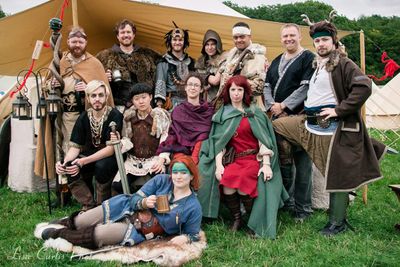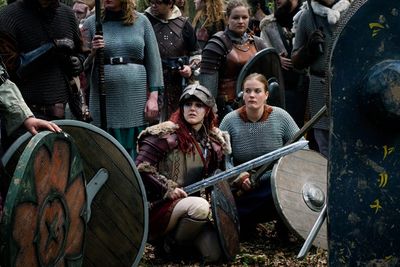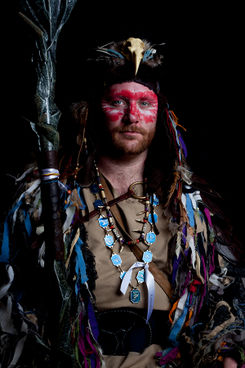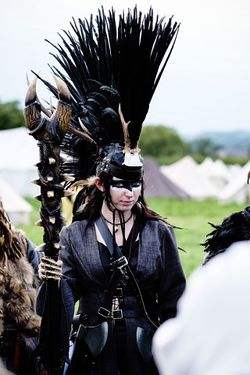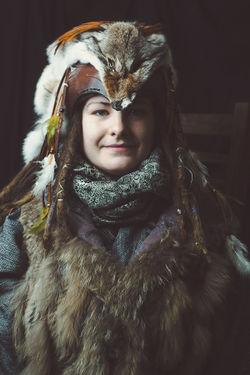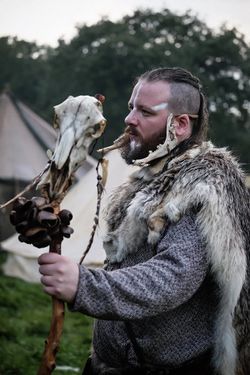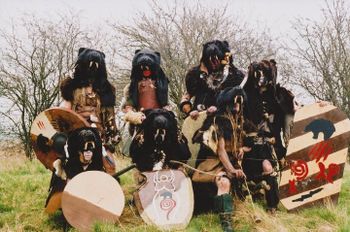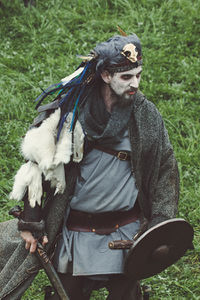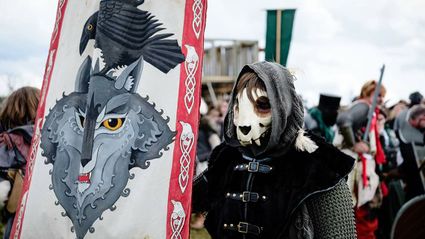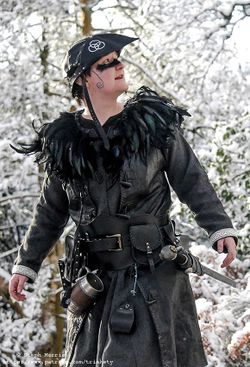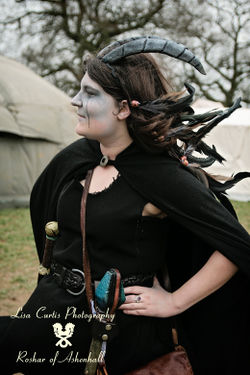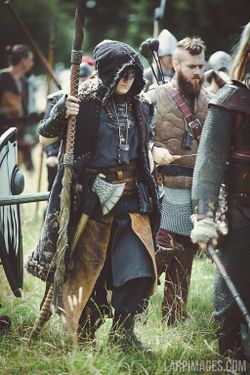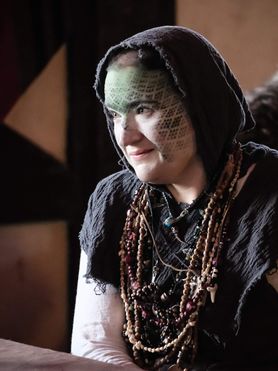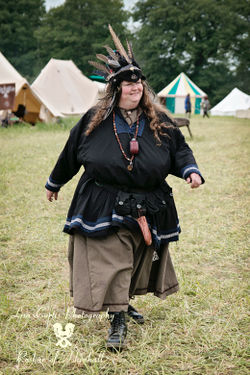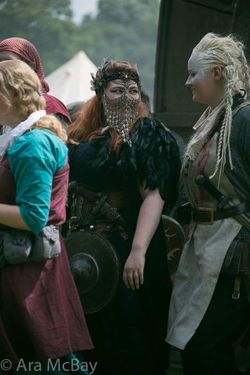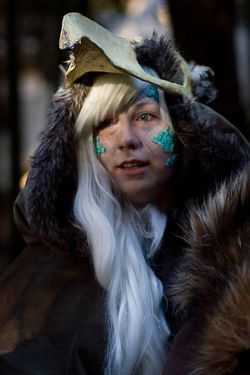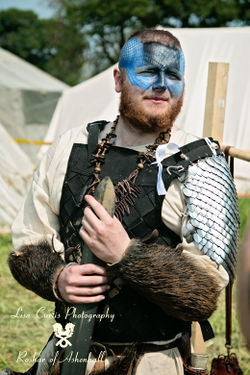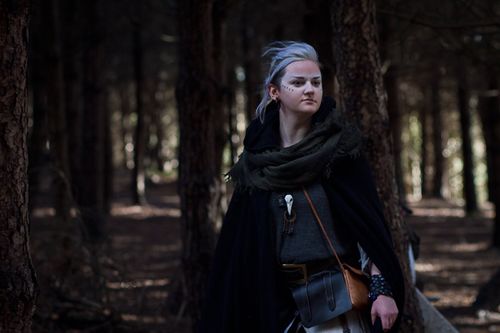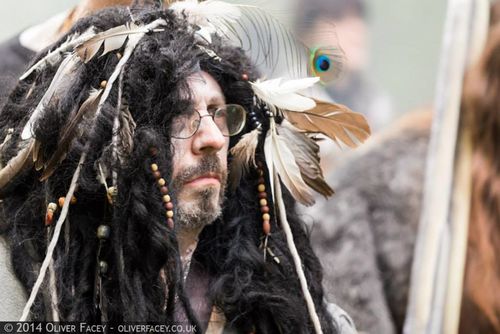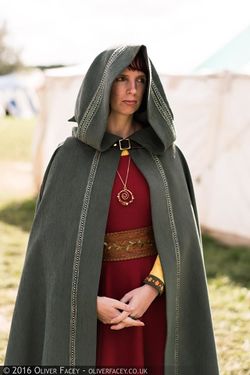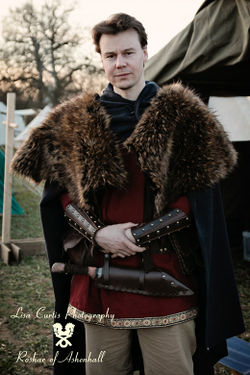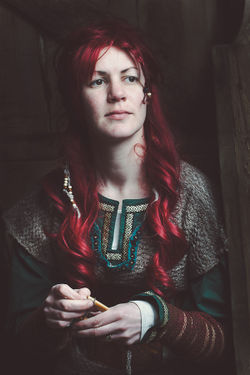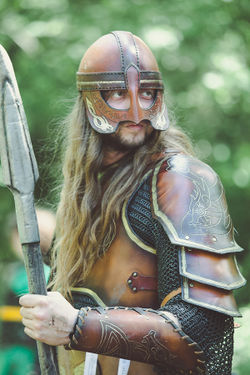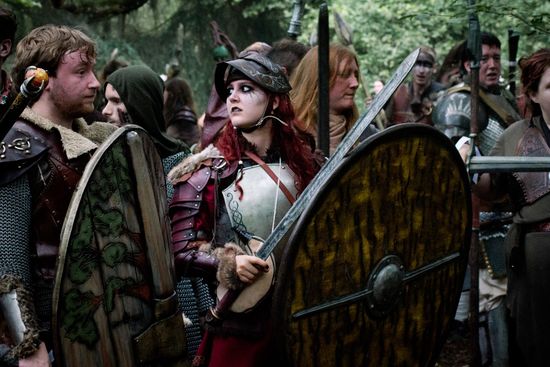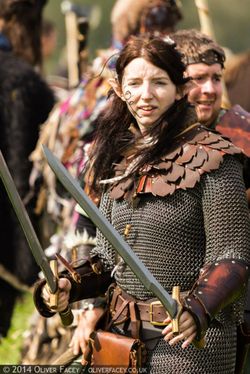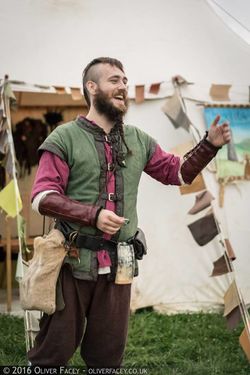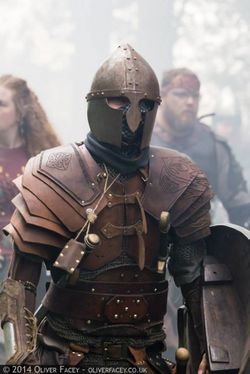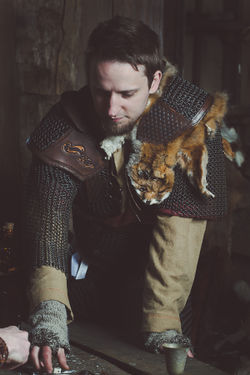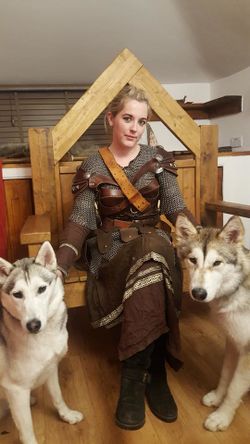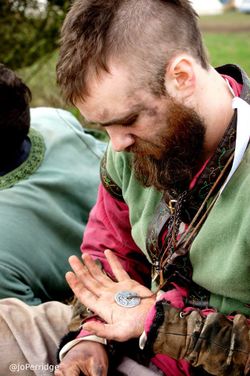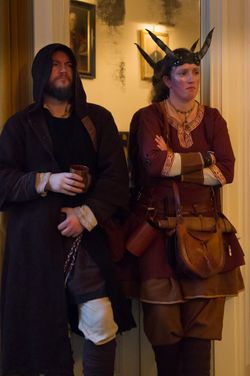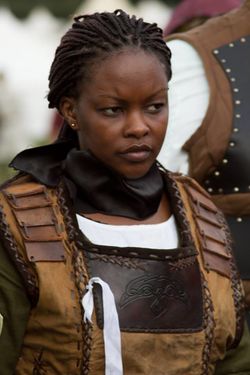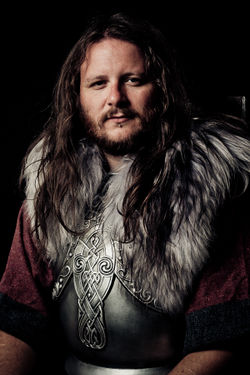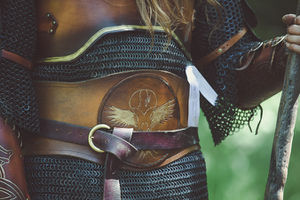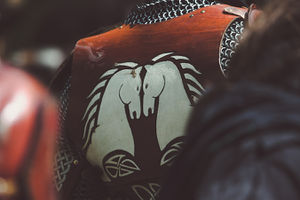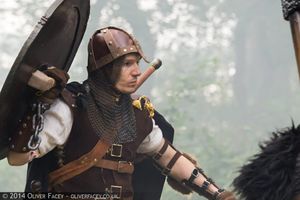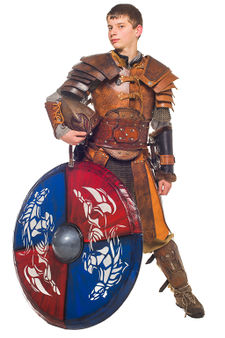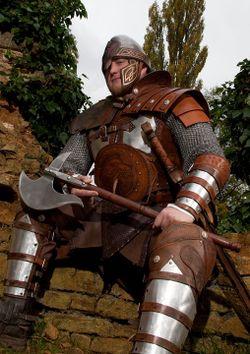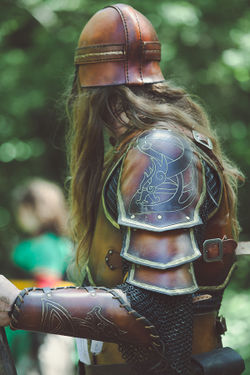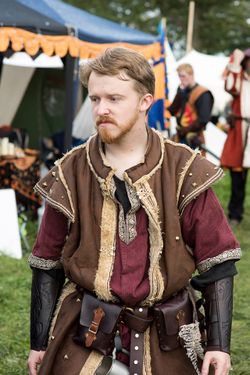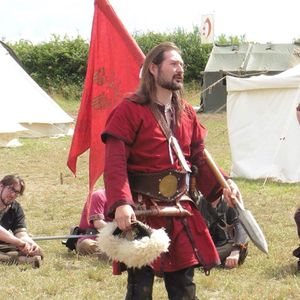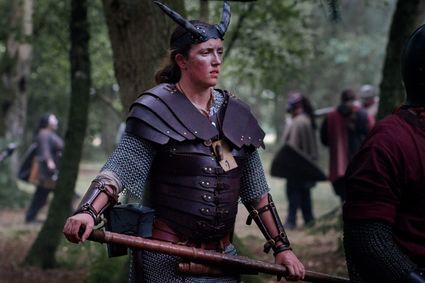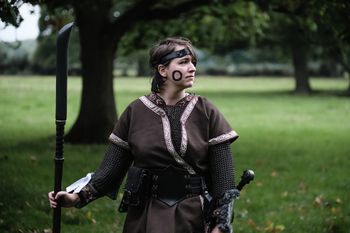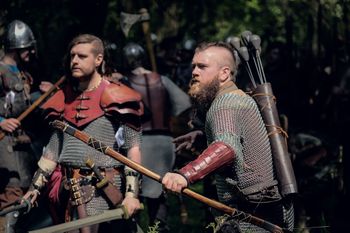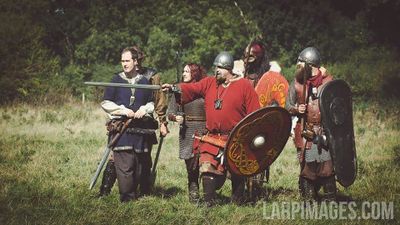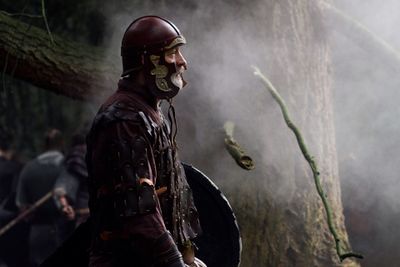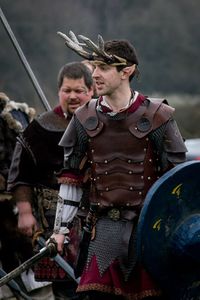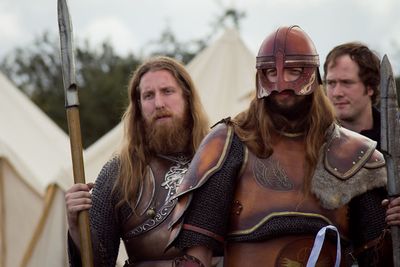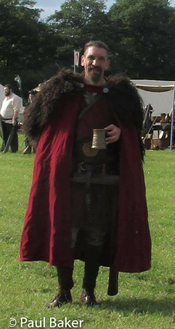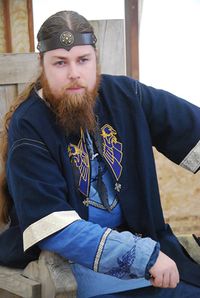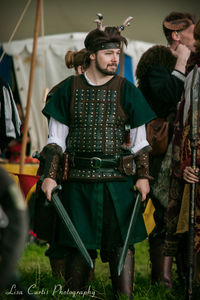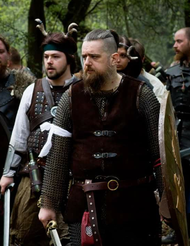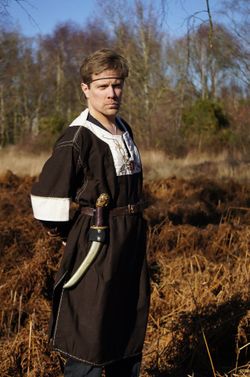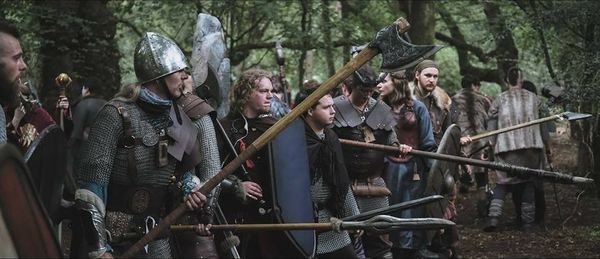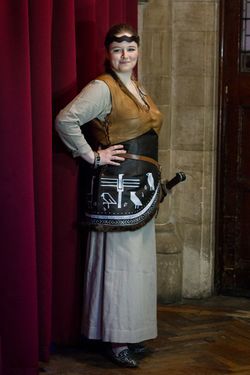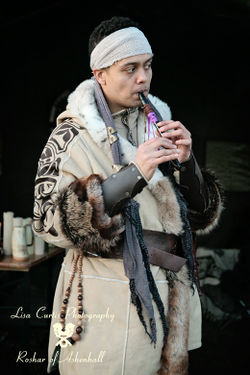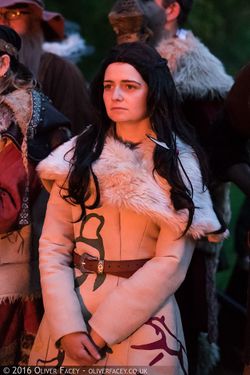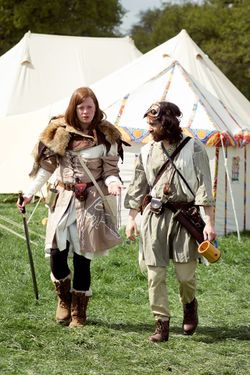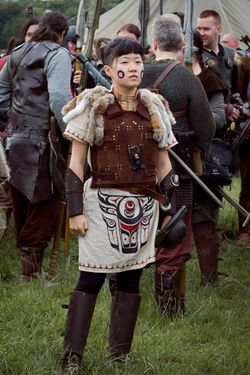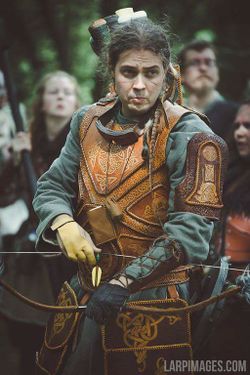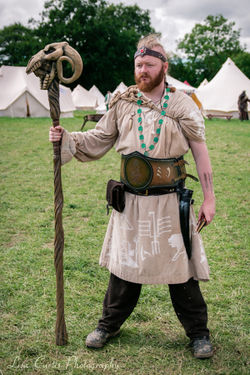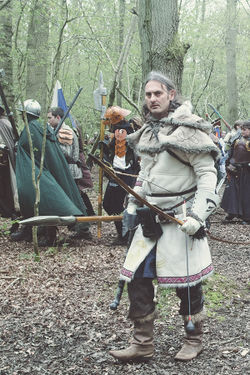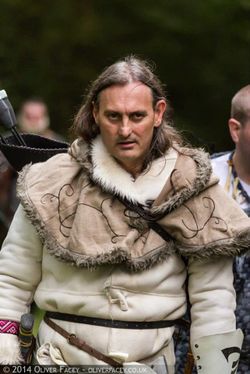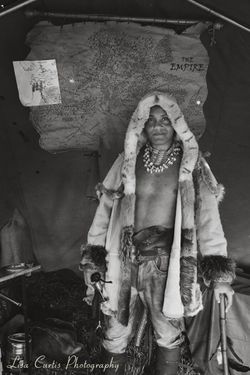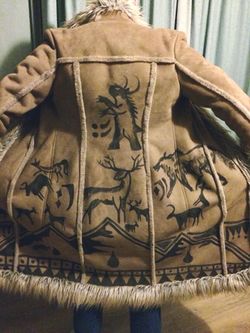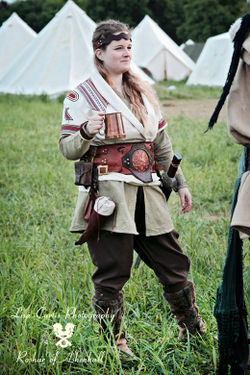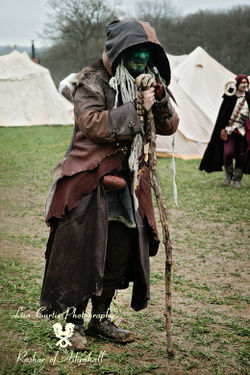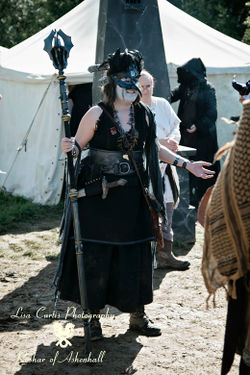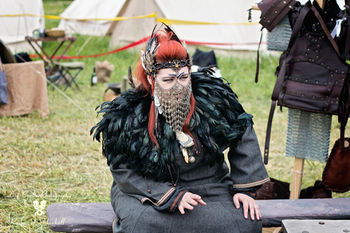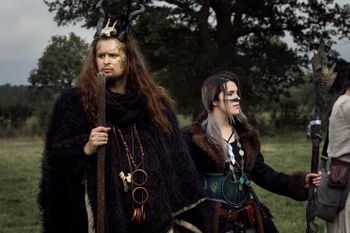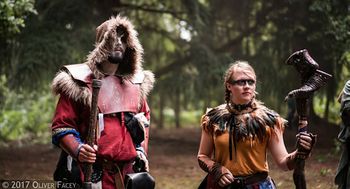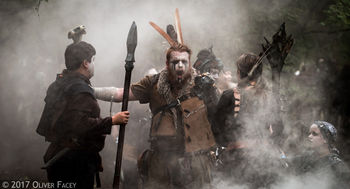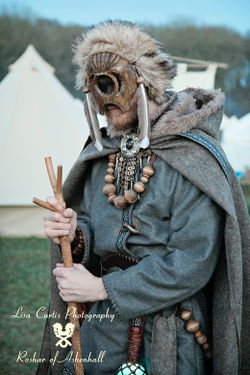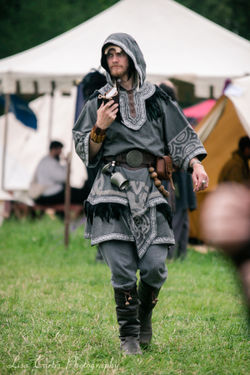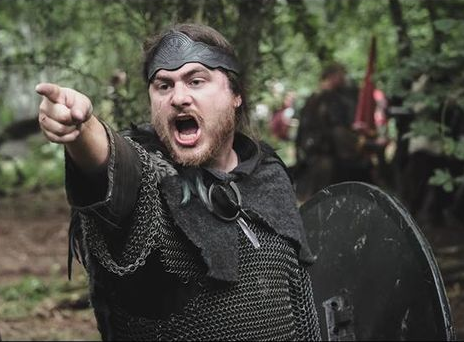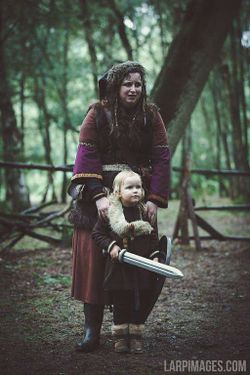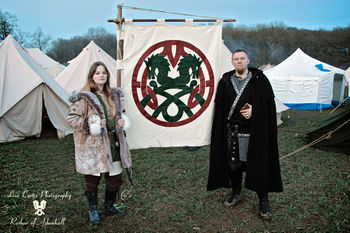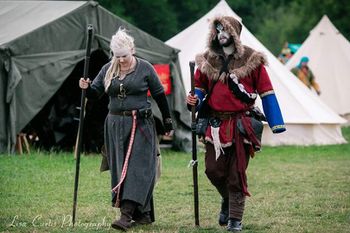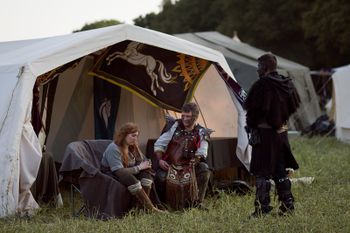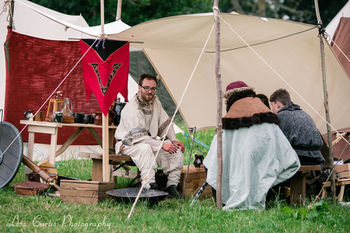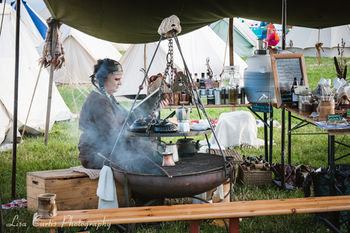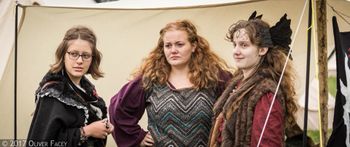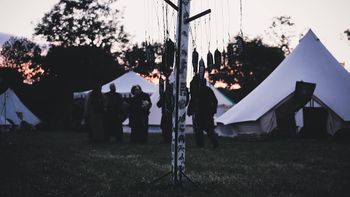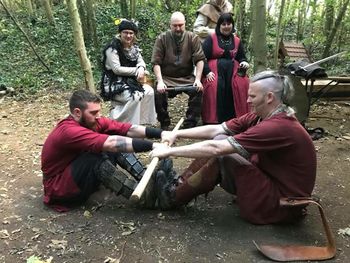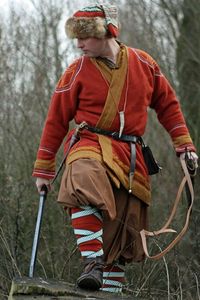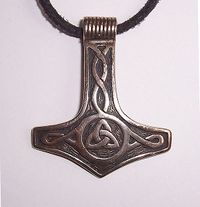Wintermark look and feel
Overview
The Wintermark look is rugged and practical but strives to express the wearer's individuality. Each of the three traditions - Kallavesi, Steinr, and Suaq - has their own style of dress and way of expressing this unique personality. Sometimes minor elements of one tradition's style will be used by another, especially where a character has embraced an archetype more often associated with a different tradition (for example, the runesmith magical path is strongly associated with the Steinr, and Suaq or Kallavesi magicians who embrace it often include elements of a more Steinr style in their day-to-day garb). Regardless of these accents, it is generally a matter of pride for the people of Wintermark to demonstrate the style of their chosen tradition as strongly as possible.
Winterfolk art tends to be intricate and detailed. Stone, metal and wood are carved with runes, so crafters can show off their skills. The people of the Wintermark use bright scarlet for things like banners because they can be seen for miles through snow and atop mountainsides.
General Breakdown
Feel: Iron, hard, firm, strong, unmoving, earnest, well-crafted, perfectionist (Steinr), practical (Suaq), dreamer (Kallavesi), individual, heroic.
The look of Wintermark is much more varied than that of some other nations due to the presence of the three traditions. Regardless of which tradition someone follows, however, certain traditional elements remain widespread through the entire nation. The differences between the three traditions are expressed in the way they add to and adorn this basic style.
The traditional costume for Winterfolk of any tradition is either a thigh-length tunic of linen or wool worn over trousers, or a close fitting dress.In case, trousers are close fitting, often with wrappings ankle to knee.
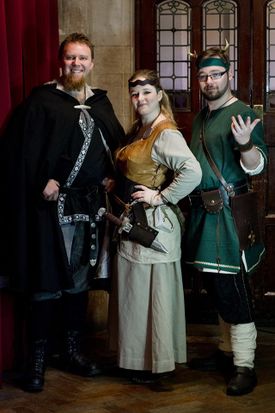
fitting dresses are popular regardless of tradition.
The Viking apron dress exists but is considered slightly old fashioned.
On the battlefield, Winterfolk favour heavy, layered armour with thick leather plates over chain. Only the Steinr make extensive use of shields, generally favouring round shields. Tear-drop shaped kite shields are also popular and provide an acceptable alternative to those who desire more full-body protection. Suaq and Kallavesi warriors tend to eschew shields altogether in favour of two-handed weapons, especially bows (for the Suaq) and spears (for the Kallavesi).
Weapons vary by tradition and individual choice, but are usually marked with runes. It is also common for Winterfolk - especially those of the Kallavesi tradition - to incorporate bird imagery into their day-to-day garb as birds hold a special place in Wintermark culture.
Also see Wintermark Costumes and Wintermark Icons and Artistry.
Kallavesi
- Influences: The Kallavesi tradition draws on images from Finland, the Kallevala, and the Crannogmen from Game of Thrones. As bog-dwelling shamans, their look is heavily informed by their mystic customs.
- Materials: Homespun checked wool, linen, fur, leather, wood and wicker, polished semi-precious stones.
- Colours: Greys, duns, moss, smoke, with occcasional bright flashes of colour. Dark feathers, especially black feathers.
Kallavesi clothing consists of the standard Wintermark thigh-length tunic over tight trousers. Garments use drab colours that would not stand out against the bogs of the Kallavesa marshlands, and the fabrics used tend to be heavier and coarser than those used by Suaq or Steinr. Their clothing often includes a heavy cloak of wool or fur, often with a hood, designed to offer protection from the elements.
Feathers are a common decoration, especially the feathers of crows and ravens. The Kallavesi are even more likely than the typical Winterfolk to work feathers, avian bones, and bird imagery into their dress, in preference to runes or totem animals. Fur - with the fur side facing out - is commonly used as an embellishment.
The Kallavesi are a tradition rooted in deep mysticism, and it is very common for even the most prosaic among them to wear personal totems, fetishes, and amulets with spiritual or magical significance. Masks are very common, usually depicting a favoured totem animal especially a bird.
Kallavsi Warriors
Kallavesi warriors favour leather and fur armour (both light and medium). When they want heavier armour, they favour leather or fur over mail. As with their clothing, armour is commonly decorated with feathers and beads. An animal headdress is sometimes worn as a helmet, sometimes in addition to more traditional head protection.
For weapons Kallavesi favour axes (especially long axes), staves, and fishing spears (often two-handed spears). Many carry an all-purpose gutting knife as a practical tool and for dispatching fallen opponents.
Kallavesi warriors rarely make use of shields. When they do they favour small wicker bucklers over the bulkier round- or tear-drop shields favoured by the Steinr.
Kallavesi Images
This gallery contains images of Kallavesi characters taken from Empire events.
Steinr
- Influences: Saxons, Rohirrim, Tolkien’s Dwarves, Beowulf (2005), the Nords of Skyrim.
- Materials: Metals, furs, leather, stone, woollen cloth; richer fabrics may be appropriate for high status Thanes.
- Colours: Dark shades of green, blue, red and brown, also dark metals – iron, coppers, bronze.
As with the other traditions, the Steinr favour a thigh-length tunic over tight trousers. While still remaining practical, Steinr clothing is designed to show off the owner’s wealth. It may be dyed a bright colour (espcially bold reds), be intricately embroidered or have decorated hems in a contrasting colour or material. Steinr tunics may be layered to show off hems that are decorated with a contrasting fabric or braid. Theoden’s costume from Lord of the Rings shows the sort of outfit a wealthy or powerful Steinr might wear to display their prosperity - the tunic is made from a rich, intricately embroidered fabric.
Steinr enjoy wearing jewellery as another way to display their prosperity, with torcs and cloak pins being very popular. Silver and bronze are as popular as gold when it comes to Steinr jewelry - it is often the fine craftsmanship that attracts a Steinr rather than the monetary value of a piece.
Almost anything a Steinr owns might be inscribed, emroidered, or painted with one or more runes. The Steinr consider themselves the originator of the magical runes, and even the most prosaic is likely to trace or evoke one to aid them in a certain task.
Steinr Warriors
The Steinr have a strong warrior culture, and the Rohirrim from Lord of the Rings epitomise the look of their warriors. Armour is usually layered, with leather (or less commonly plate) worn over mail. The armour is often intricately tooled and embellished, again proudly displaying the wealth of the wearer. Conformity and uniformity are considered slightly distasteful by many Steinr - each considers themselves a heroic champion of their people and displays this individuality through their weapons and armour.
On the battlefield Steinr favour long swords, spears (both one- and two-handed), and Dane axes. Their weapons are heavy and practical, and as with everything else almost invariably decorated with runes.
When fighting with a one-handed weapon, the Steinr favour round shields, although tear-drop shaped kite shields are not uncommon.
Steinr Images
This gallery contains images of Steinr characters taken from Empire events.
Suaq
- Influences: Think of Sami reindeer herders and Inuit; independent scouts and hunters.
- Materials: Furs and hides, ivory, scrimshaw carved bone items.
- Colours: Light, washed out tones of cream, ivory, taupe, pale grey.
In addition to the thigh-length tunic, a Suaq commonly wears a heavy coat - an iconic piece of clothing for this tradition. These heavy coats protect them against the cold and the elements, and have become a symbol of their independence and self-reliance. Commonly made of reindeer and seal skin, they are turned fur side in for warmth. Ideally the heavy fur coats are richly decorated with important symbols — designs of totem animals and symbols of enemies the warrior has killed are common as are the ubiquitous bird images and runes common to all Winterfolk.
While the traditional coat is heavy leather and fur-lined, in warmer climates, the coats may be lighter leather. In the imperial heartland in summer, sensible Suaq may chose to wear linen or canvas versions.
Jewelry is not unknown but tends to be more discreet than that favoured by the Steinr or even the Kallavesi. Shiny metal attracts attention, and is often seen as at odds with the Suaq's role as hunters. Rather than metal torcs, rings, or bangles Suaq favour more natural materials - intricately tooled leather bracers, ivory or bone ornaments, feathers, and painted or engraved beads.
Suaq Warriors
Like the Kallavesi, Suaq warriors prefer leather armour for general use, and don mail shirts when they need heavier (and more restrictive) protection. As with their coats, Suaq paint their armour with symbolic designs of animals.
Perhaps unsurprisingly, the Suaq favour traditional hunting weapons. They are the Winterfolk who make the most use of bows, and they favour both both one- and two-handed) spears in melee. Some also make use of staves, which serve the dual purpose of being weapons and aiding in crossing treacherous ice or snow.
It is uncommon for a Suaq to carry a shield, but when they do they favour leather stretched over wood frames or practical round wooden shields.
Suaq Images
This gallery contains images of Suaq characters taken from Empire events.
Wintermark Magicians
Each of the three traditions has their own magical heritage. Any Wintermark magician might embrace any one of these paths, but they tend to be drawn towards the approach that matches their tradition. Where they follow a different path, they often combine elements of their tradition and their magical approach to create a unique look.
Runesmith
Runesmiths are a predominantly Steinr tradition. Even more so than other Winterfolk characters, their possessions will be marked with the powerful magical runes that are the focus of their study.
Mystic
Mystics are primarily drawn from the Kallavesi tradition. Most supplement their tradition's iconic costume with an animal headdress decorated with feathers and fur.
Icewalker
The Suaq make up the majority of the savy icewalkers. They wear clothing appropriate to their tradition but supplemented with jewellery and amulets. Unlike runesmiths, their magical accoutrements are more likely to be adorned with stylised animals or symbols of a person nature with only a scattering of runes. Non-Suaq Icewalkers may adopt the Suaq tradition of painting animal totems on their mage armour or clothing.
Wintermark Priests
In general, priests of Wintermark dress like the people they live alongside and counsel.
Those who embrace the path of the stormcrow wear a traditional ragged, heavy cloak and a costume adorned with tatters of material and fetishes. Even stormcrows who are not of the Kallavesi tradition are likely to incorporate some elements of the mystic look into their costume - especially when it comes to feathers and ceremonial masks.
Wintermark Children
Children generally dress in the same style as their parents, at least until they are old enough to express a preference for one tradition or another. Even before they have passed their Citizenship tests, some Winterfolk children feel drawn enough to a tradition that differs from that of their parents to favour dressing as if they were already a member.
Camps
Images to avoid
An LRP setting is defined as much by what you leave out as by what you include. In defining the Wintermark look we have actively chosen to exclude some elements. Please do not use any of the images or looks seen in this section. In particular please note that the Winterfolk were inspired by Saxons rather than Vikings and the setting does not include longships and the associated imagery.
